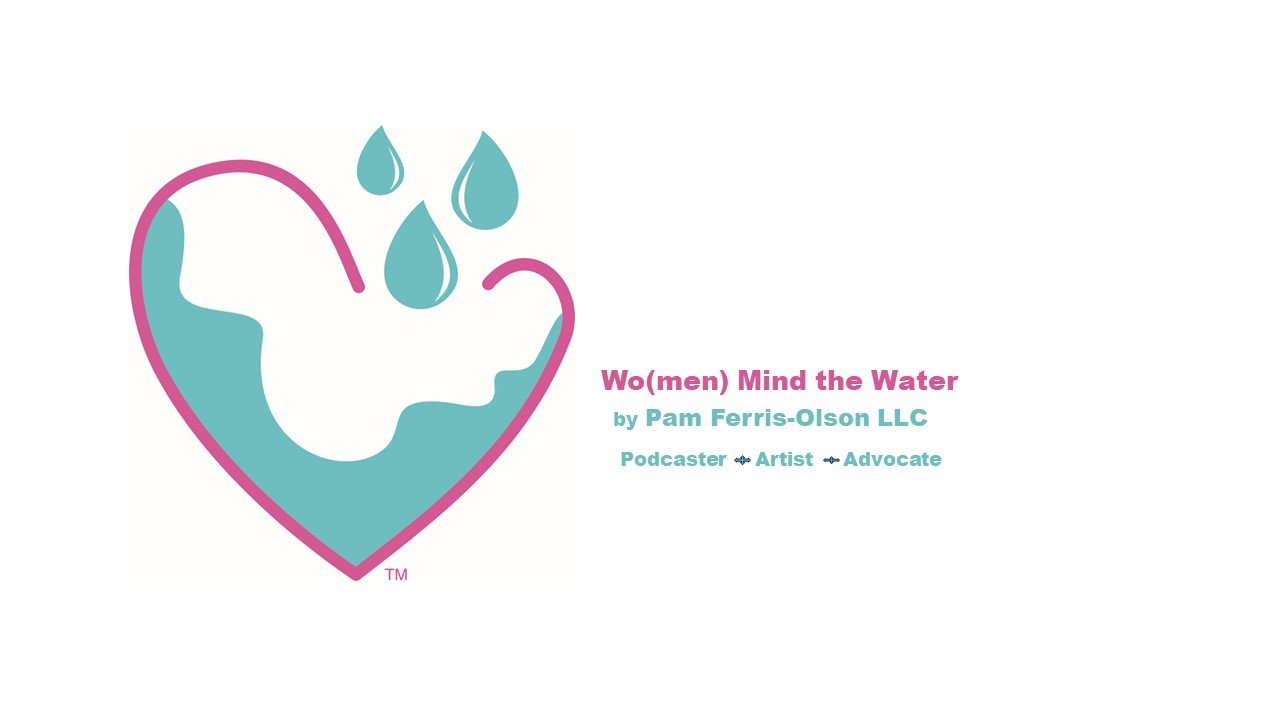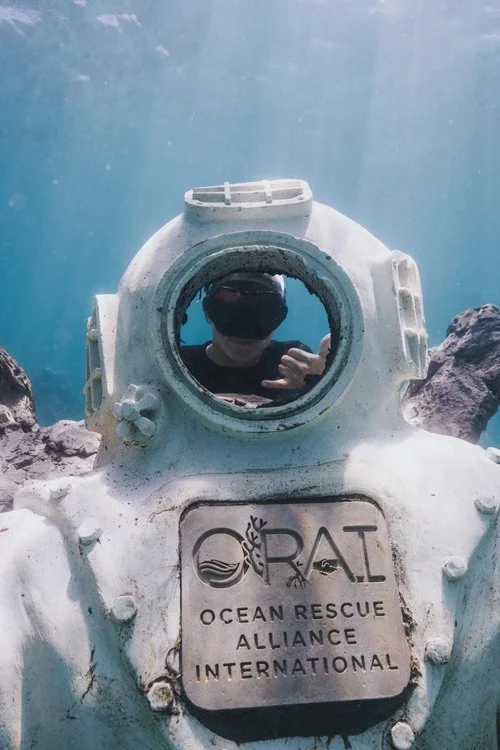100th Anniversary Podcast with host Pam Ferris-Olson
100 episodes globally produced podcast of ocean art/ artist interview, marine conservation theme. Podcaster discusses podcast production, shares personal stories
Shelby Thomas
Shelby Thomas, Ocean Rescue Alliance International, restores marine ecosystems. The non-profit has installed more than 300 modules, some in the form of mermaids, as living reefs off southern Florida. They are ideal spots for coral restoration, marine life, research and tourism. Shelby is the latest guest on the Wo(men) Mind the Water Artivist Series on womenmindthewater.com.
Susan Baur
Susan Baur is founder of Old Ladies Against Underwater Garbage, a group of women aged 64 and up that dive for sunken garbage in ponds. Their work restores the ponds and enhances the lives of the women. It’s physically demanding work but the women are rewarded with camaraderie, self-satisfaction, and cookies.
Krista Shoe
Krista Shoe is founder of Mother of Corals, an organization based in Panama involved in coral restoration and education organization. Mother of Corals others to learn and participate in coral restoration and conducts its own coral restoration to combat rising ocean temperatures.
Arielle Moody
Arielle Moody worked in the beauty industry for more than 15 years, before she started her own company. Mama Sol was a collaboration between three women who wanted to protect themselves, their children, and the planet from the harmful petrochemicals found in many commercially available sunscreens. Mama Sol’s tagline is: “For all mamas, Mother Earth included.” In addition to protecting the skin from the harmful rays of the sun, the sunscreens are also less harmful to coral reefs. Important because it has been estimated, that roughly one fifth of the world’s coral have died in the past three years.
Jada Alexander
Jada Alexander has a deep reverence for the ocean. Her personal journey as a young Black woman left her with emotional scars. She has come to understand that the ocean is more than a place to surf. Jada is the founder of the Daybreak Beach Club. Daybreak teaches participants to enjoy, respect and protect the ocean while discovering that the ocean provides a path to healing and personal growth.
Indira Brooks
Indira Brook, the latest guest on the Wo(men) Mind the Water Artivist Series podcast, is a manager at Roatán Marine Park. The marine park is a non-profit dedicated to the protection of the Caribbean island located about 40 miles off the northern coast of Honduras. Indira’s work for the Roatán Marine Park involves working with people to protect coral reefs, mangroves and other marine species. Roatán’s coral reefs are second only in size to Australia's Great Barrier Reef. Indira is currently working with others to institute an island-wide ban of sunscreens containing petrochemicals. Coral bleaching and deformity in the development of fish are attributable to the petrochemicals in sunscreen. (https://womenmindthewater.com/featured-guests)
Lucy Hunt
Lucy Hunt is the founder of Sea Synergy, a Marine Awareness Research and Activity Center situated on the southwest coast of Ireland. Lucy is passionate about the ocean and has been working for more than a decade to make meaningful experiences so that others may discover the rich diversity of the marine environment. Lucy offers a range of workshops and activities for people of all ages to help them get to know the waters that border Ireland. For her tireless work Lucy Hunt has received recognition by His Royal Highness King Charles.
Oriana Poindexter
Artist Oriana Poindexter free dives off the California to collect seaweed and uses a mix of traditional and alternative photographic processes (photography and photograms) and printmaking to reflect their beauty. She finds inspiration in nature and believes that every person can find beauty by interacting with the natural world.
Manuela Zoninsein
Manuela Zoninsein began as a journalist in China. While there, she witnessed a shift from reusable to single-use water bottles. The Brazilian-American’s love for beaches in Rio de Janeiro and her studies at MIT-Sloan Executive MBA program, led her to start Kadeya, a company that aims to replace single-use plastic bottles with an innovative vending machine that reduces plastic consumption.
Sophie Guarasci
Sophie Guarasci worked in the world of fashion and finance before becoming a licensed veterinary tech. She works at the Marine Mammal Center, the nation’s foremost marine mammal hospital located just north of San Francisco. Sophie oversees the clinical and surgical treatment and husbandry of seals, sea lions, and sea otters. It’s her dream job, even though there are times she has to make difficult decisions about the treatment of severely ill animals. Sophie believes that people wherever they live should care about these marine animals as they tell us much about what is going on out there in their home the ocean, which is tied to human health. And for her, every time the Center is able to release an animal back into the ocean, Sophie feels hope that she is making a difference.
Angela Abshier
Angela grew up in Wyoming and originally went college to be study journalism but pivoted to law when she heard about Napster and the potential it had for dispossessing musical artists from their artistic property. Angela believes that when a system is broken and you have an idea of how to fix it or change it or make it better, it’s worth it to step in and make it happen. After she was introduced to sailing and she saw the massive super yachts with their huge sails, her creative mind took hold. She learned that some of the material is extraordinary and yet it had a limited life span. She wanted to make a positive difference with the decommissioned sails that otherwise ended up as landfill. Angela has invested her own human capital and worked with architects and others to find ways to use the sails for humanitarian purposes. One of the first projects for Sail to Shelter is installing sails in Maui to answer a number of different issues. Maui suffered a devastating fire in August 2023,
Suzette Bousema
Suzette Bousema is an emerging Netherlands-based visual artist. Suzette collaborates with environmental scientists to explore present day ecological crises and engages audiences by using a variety of techniques including photography and glass blowing to help understand abstract concepts. On the podcast we discuss her efforts to photograph ancient polar ice cores , to create her own climate archive with glass bubbles, and how to personally cope with big ecological issues.
Sarah Cameron Sunde
Sarah received the prestigious Guggenheim Fellowship for her nine-part series 36.5/A Durational Performance with the Sea. This work has been performed on six continents in places as far flung as New Zealand, Kenya, and New York City. Sarah’s intention is to connect humans with water and the impact of climate change. During each site specific performance she stands in the water for a full tidal (12.5+ hours). The rise and fall of the tide on her body is reflective of what has occurred in nature in the ancient past and will continue to do so unrelentingly into the future.
Tracy Metz
Tracy Metz is a journalist, author and podcast maker. She also is the director of the John Adams Institute, an independent foundation in the Netherlands, that brings the best and the brightest of American thinking to the Netherlands. Tracy is passionate about the interplay between urban issues, architecture, and the natural environment, particularly water. Her book Sweet&Salt: Water and the Dutch, investigates the change in the country’s approach to water management in times of climate change. Her podcast Water Talks addresses global issues with water – too much, too little, too dirty and too unequal. Water Talks grew out of the United Nations conference on water held in NYC in March 2023.
Holly Rankin aka Jack River
Holly Rankin is the latest guest on the Women Mind the Water Artivist podcast series on WomenMind theWater.com. Holly is an Australian singer/songwriter/festival promoter, and an activist in the areas of environmental and social justice. Also known as Jack River, her music often deals with difficult topics, like personal tragedy, climate change, and social justice. Holly believes transforming such messages into music has the power to inspire action.
Kara Dodge
Kara Dodge is a research scientist at the Anderson Cabot Center for Ocean Research, the research arm of the New England Aquarium in Boston. Her specialty is the ecology of marine animals, more specifically sea turtles. Kara uses cutting-edge technology like satellite tagging and drones to enrich our knowledge of sea turtles and the impacts of humans on them.
Hannah St. Luce-Martinez
Hannah St. Luce-Martinez, well-versed in Belize’s natural and cultural resources, is the latest guest on Women Mind the Water Artivist Series. She describes Belize, its natural resources, conservation and biodiversity, and the importance of promoting inclusivity and empowering youth and women.
Hoku Cody
Hoku Cody, a Native Hawaiian, seabird biologist, and life-long ocean lover, protector, and advocate advocates for community stewardship in actions, that revitalize traditional rights within Hawaiʻi’s natural and cultural resource management industries. Hoku works with the National Ocean Protection Coalition to create and support marine protected areas and have the Pacific Remote Islands designated a National Marine Sanctuary.
Vicki Nichols Goldstein
Vicki Nichols Goldstein is the latest guest on the Women Mind the Water Artivist Series podcast. Vicki is founder of the Inland Ocean Coalition. Her impressive credentials include a master’s degree in marine policy from Yale University and working with the National Oceanic and Atmospheric Administration to co-write documents for the designation of the Monterey Bay National Marine Sanctuary. Vicki served as the Executive Director of the California-based Save Our Shores. When she moved to Colorado, she founded the Colorado Ocean Coalition and in 2017 Vicki rebranded it as the Inland Ocean Coalition. Inland Ocean Coalition empowers citizens wherever they live to be leaders and make positive contributions to ocean protection.



















